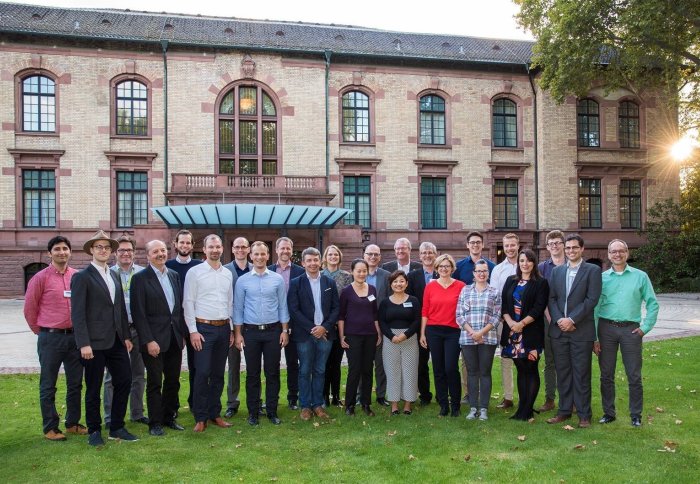Imperial and BASF partner to advance innovative form of chemical manufacturing

The Imperial and BASF team at the BASF complex in Ludwigshafen
Imperial College London and chemical company BASF are working in partnership to develop flow chemistry, an innovative approach to chemical production.
The technique could allow the chemical industry to manufacture chemicals, for example agrochemical actives, far more efficiently than they do now.
The transition from batch to flow chemistry is similar to the transition from piece-by-piece manufacturing to industrial production on a conveyor belt Professor Mimi Hii, Imperial
Traditionally, chemicals are produced in batches by placing the ingredients, reagents, into vessels known as batch reactors. Some time is allowed to complete the reaction, before the product is extracted. The whole process can be very slow, as extra time is needed for the reactor to be unloaded and cleaned in between batches. The productivity is limited by the volume of the reactors, how long the reaction takes, and how efficient the mixing is.
In contrast, in flow chemistry, chemicals are produced continuously by pumping reagents through the reactor, a process that is easier to control and produces more consistent results.
“The transition from batch to flow chemistry is similar to the transition from piece-by-piece manufacturing to industrial production on a conveyor belt,” said Professor Mimi Hii in Imperial’s Department of Chemistry. “Flow chemistry will produce higher-quality products at scale.”
Klaus Hellgardt, Professor of Chemical Engineering at Imperial, said: “We are excited to be working with BASF not only to advance the science and engineering, but also to train a new generation of chemists who are familiar and cognate in flow chemistry. To get modern techniques into companies you need champions, and you need to create these champions.”
Dr Darren Budd, Commercial Director (UK and Ireland) at BASF, said: “We want to make flow chemistry a success for BASF and the global chemical industry. It is pleasing to see these advanced processes developed and pioneered in the UK, strengthening the country’s position as a global leader in chemical manufacturing. By combing our sectoral insights with the academic expertise and resources of Imperial College London, we aim to push the technology forward and upskill the workforce in the chemicals sector.”
Manufacturing advances
This research is a real opportunity to complement world-scale production with a more flexible alternative. Dr Christian Holtze, BASF
While some companies, including BASF, already use continuous processes routinely to manufacture chemicals at large scale (typically kilotonnes), a key challenge is to implement flow chemistry at smaller scales (kilograms), specifically for the manufacture of low-volume, high-value chemicals, including speciality chemicals.
Continuous flow would also allow them to distribute manufacturing across smaller plants, reducing the cost of shipping and creating more localised and resilient supply chains – something that may become increasingly important post-COVID-19.
Dr Christian Holtze, Senior Research Engineer at BASF, said: “The current paradigm is the bigger you get, the cheaper you can make your chemical. The world’s supply is produced by a handful of chemical plants. This research is a real opportunity to complement world-scale production with a more flexible alternative. By partnering with Imperial on an interdisciplinary and holistic approach to flow chemistry, we’re helping to introduce a new mindset, and also changing the way R&D is done.”
Transforming the chemical industry
BASF is partnered with Imperial on several flow chemistry projects at Imperial’s EPSRC Centre for Doctoral Training in Next Generation Synthesis & Reaction Technology, led by Professor Hii and Professor Sophia Yaliraki in the Department of Chemistry, and Professor Klaus Hellgardt in the Department of Chemical Engineering.
Mimi Hii, Professor of Catalysis at Imperial, said: “In Imperial’s new home for chemistry, the Molecular Sciences Research Hub, we are pursuing advanced work in flow chemistry, automation and data science, and it is great to join our world-leading expertise and resources with those of BASF to help drive innovations in the chemical industry by deploying the outcomes of our collaboration in industrial practice.”

Enterprise opportunity
Imperial works with a range of industry partners to address industry challenges and create a more healthy, smart, resilient and sustainable society.
Dr Simon Hepworth, Imperial’s Director of Enterprise, said: “We are delighted to be partnering with BASF, one of the world’s leading chemicals companies. Through this partnership, we are not only applying our expertise to their business challenges, but also working with them to bring important benefits to the chemical sector, the UK economy and ultimately to wider society.”
Companies interested in partnering with the College on research or helping take technologies developed at Imperial to market learn more about opportunities by contacting the College’s Enterprise Division.
Article text (excluding photos or graphics) © Imperial College London.
Photos and graphics subject to third party copyright used with permission or © Imperial College London.
Reporter
David Silverman
Communications Division